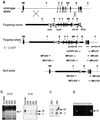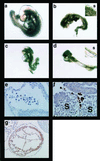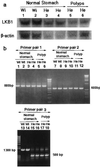Role of Lkb1, the causative gene of Peutz-Jegher's syndrome, in embryogenesis and polyposis
- PMID: 12060709
- PMCID: PMC124396
- DOI: 10.1073/pnas.122254599
Role of Lkb1, the causative gene of Peutz-Jegher's syndrome, in embryogenesis and polyposis
Abstract
Peutz-Jeghers syndrome (PJS) is a dominantly inherited human disorder characterized by gastrointestinal hamartomatous polyposis and mucocutaneous melanin pigmentation. LKB1 (STK11) serine/threonine kinase is the product of the causative gene of PJS, which has been mapped to chromosome 19p13.3. However, several studies have produced results that are not consistent with a link between LKB1 gene mutation and PJS. We constructed a knockout gene mutation of Lkb1 to determine whether it is the causative gene of PJS and to examine the biological role of the Lkb1 gene. Lkb1(-/-) mice died in utero between 8.5 and 9.5 days postcoitum. At 9.0 days postcoitum, Lkb1(-/-) embryos were generally smaller than their age-matched littermates, showed developmental retardation, and did not undergo embryonic turning. Multiple gastric adenomatous polyps were observed in 10- to 14-month-old Lkb1(+/-) mice. Our results indicate that functional Lkb1 is required for normal embryogenesis and that it is related to tumor development. The Lkb1(+/-) mouse is suitable for studying molecular mechanism underlying the development of inherited gastric tumors in PJS.
Figures




References
-
- Jeghers H, McKusick V A, Karz K H. N Engl J Med. 1949;241:992–1005. - PubMed
-
- Peutz J L. Ned Tijdschr Geneeskd. 1921;10:134–146.
-
- Linder N M, Greene M H. J Natl Cancer Inst. 1998;90:1039–1071. - PubMed
-
- McGarrity T J, Kulin H E, Zaino R J. Am J Gastroenterol. 2000;95:596–604. - PubMed
-
- Jenne D E, Reimann H, Nezu J, Friedel W, Loff S, Jeschke R, Muller O, Back W, Zimmer M. Nat Genet. 1998;18:38–43. - PubMed
MeSH terms
Substances
Associated data
- Actions
- Actions
- Actions
LinkOut - more resources
Full Text Sources
Other Literature Sources
Molecular Biology Databases

